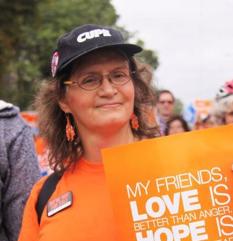
Trans activist Susan Gapka, chair of the Trans Health Lobby Group. Credit: Susan Gapka's Facebook
In the suburban riding of Mississauga–Brampton South, Christin Milloy is making history as the first out trans candidate to run in a Canadian provincial election.
Aside from municipal elections, the only other out trans candidate was nominated in 2007 at the federal level in the riding of Quebec City, says trans activist Susan Gapka, chair of the Trans Health Lobby Group. At that time, activist and lawyer Micheline Anne Montreuil became the first out Canadian trans person ever to be nominated as an electoral candidate by a major political party, the NDP. But Montreuil didn’t make it to the end of the campaign. She claimed she was dropped because the NDP objected to her gender identity. The party said she was too confrontational during interviews.
Milloy, 27, is running for the Libertarian Party. She says one of her platform priorities is modernizing the process to change sex designation on a birth certificate. She says there are currently unnecessary and potentially harmful barriers for trans people if they want to change their birth certificates.
“We have a situation where the government is actually forcing trans people to mutilate their bodies,” she says. “There’s a lot of bureaucracy in changing your sex designation in Ontario. For the birth certificate, which is issued by the province, proof of transsexual surgery is required. That’s the exact phrase they use.”
The problem is, she points out, there is nothing in the package of government-issued forms that states clearly what exactly constitutes “transsexual surgery.”
Some trans people require only hormones, breast augmentation or a tracheal shave for their Adam’s apples, Milloy says. “So, if the person has a cooperative healthcare provider, the forms are signed and it goes through.”
But what about the trans person who passes without the help of the surgeon’s knife? Perhaps the hormones are successful? Milloy wonders, “Does this person have any hope under the law of changing their sex designation on their birth certificate?
“It’s a huge point of discrimination that not a lot of people know about. I plan to fight for the rights of pre-operative and non-operative trans people. We deserve the same recognition as the rest of society.”
Gapka agrees. Loosening bureaucracy around sex designation on birth certificates is one of her group’s top priorities. The other priorities include amending the Ontario Human Rights Code and the Canadian Human Rights Act to include gender identity and increase access to primary care, such as hormones, therapy and sex reassignment surgery (SRS).
“Surgery means different things to different people. Some people identify as genderqueer. It should be easier to change legal identity documents. You shouldn’t need surgery to do it,” Gapka says.
Milloy says she will also fight for increased coverage of SRS procedures. “SRS is simply not accessible to trans people in Ontario,” she says.
SRS was first listed by OHIP in 1971, but then-premier Mike Harris cut the funding in 1998, Gapka explains. The procedure was relisted under the Ontario Liberals in 2008. At the time, the minister of health, George Smitherman, said eight to 10 people undergo SRS every year at a total annual cost of about $200,000.
But Milloy says there’s still a glaring problem when it comes to top surgery. Breast augmentation and removal is still not covered by OHIP. “For trans men who need to have their breasts removed, and for trans women, who, for whatever reason, maybe the hormones are not working and they need breast augmentation, [OHIP] says, ‘No, it’s cosmetic.'”
Milloy says it’s an injustice that trans people must pay for top surgery out of their own pockets.
“SRS is just the actual genital reconfiguration,” she says. “[Top surgeries] are completely independent and separate surgeries.”
She argues that the medical condition gynecomastia — an intersex condition when non-trans men grow breasts — is 100 percent covered by OHIP. “It’s hormonal and considered a medical treatment. A man growing unwanted breasts is considered an indignity… Clearly the decision makers at OHIP acknowledge the fact that having non-gender appropriate breast configuration is an indignity and needs to be corrected medically. The same is true for trans people.”
Gapka agrees but says lobbying the government to cover breast augmentation is not a political priority. For Gapka, electrolysis of facial hair is the more urgent need. “We want the government to cover that and they haven’t yet.”
On trans health issues, Milloy acknowledges that she strays from the Ontario Libertarian Party’s platform, which states that publicly funded healthcare will slowly be “dismantled… Eventually everyone will be responsible for the full cost of their own healthcare.”
Milloy says the Libertarian Party is a completely “new approach to government.” Over time, she says, healthcare should eventually be put in the hands of the private sector. “Healthcare should be opened up to private companies for SRS. That will increase the access for people and lower costs.
“Libertarians believe that many problems in society can actually be solved by repealing legislation and making the government smaller,” she says.
Milloy says her other platform priorities are eliminating the HST and taking alcohol sales out of the hands of the LCBO and handing it over to private businesses, such as convenience stores.

 Why you can trust Xtra
Why you can trust Xtra


